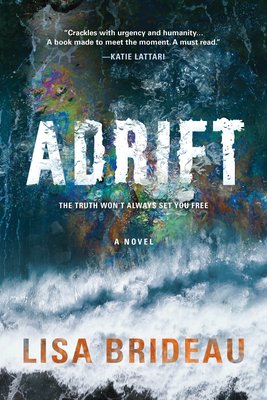Adrift
by Lisa Brideau
In the opening scene, a young woman wakes on a sailboat. She doesn’t know who she is or how she got there. She doesn’t remember anything prior to waking up a few minutes ago. She doesn’t even recognize her own face in the mirror.
Taped to the counter in the boat’s galley is a note:
This is the only way out alive.
Start over.
Don’t make yourself known.
Don’t look back.
Her boat is at anchor next to some forested islands. And despite her loss of personal memory, she appears to know about boats and sailing. Searching on board, she finds navigation charts and five hundred dollars in Canadian bills. There’s also an envelope with a British Columbia driver’s license in the name of Sarah Song, along with a bank card and info about an overseas bank account in the same name. The photo on the license is hers. Another envelope contains ownership papers for the boat, also in the name of Sarah Song.
The name “Sarah” doesn’t feel right, so she thinks of herself as just “S” — or Ess.
The galley has some food (oatmeal, breakfast bars and freeze-dried meal packets) but there’s less than a litre of drinking water. And there’s a bad storm coming, so she needs to get moving. She figures out that her boat is anchored near a remote island off the northern coast of British Columbia. Using her charts and sailing knowledge, she takes the boat to Skidegate, one of the larger villages in the archipelago of Haida Gwai (formerly known as the Queen Charlotte islands.)
There she begins looking for answers, but cautiously: she remembers the note’s warning “don’t make yourself known.” However, she ignores the other instruction, “Don’t look back.” She wants to know how she got there; she wants to recover her memory; and in particular, she wants to locate any family or loved ones who may be missing her.
The book is set in 2038, fifteen years in our future. The effects of climate change have intensified, and Canada is a desired destination for climate refugees. Ess learns that other amnesia cases have been turning up, people found stranded on boats with no memory. But, unlike Ess, they have no money, bank accounts or other resources. When found, they are being incarcerated until their identity can be traced. Ess has to hide her own amnesia to avoid being taken into custody herself, while desperately searching for answers to her urgent questions.
The story continues from there, with believable and interesting characters (including some villains) and numerous plot twists. I literally could not put the book down until I finished it. It’s a satisfying thriller, as well as a warning about where climate change may take us.
This is Lisa Brideau’s debut novel, published in May 2023. It’s had an excellent reception, with prominent reviews in the Globe and Mail, the CBC, Booklist and others.
Brideau was born in Dartmouth, Nova Scotia. She moved to Ottawa for university, receiving a Bachelor degree in Aerospace Engineering from Carleton University, and subsequently worked on NASA contracts. She then moved to Vancouver for graduate school, receiving a Master of Science in Urban Planning from the University of British Columbia. Her concerns about climate change are real; she currently works as a sustainability specialist focused on climate policy and climate justice, and she hopes her novel inspires people to action. She and her husband of 20+ years live in Vancouver, along with “a herd of cats.”
[Click here to sign up to my book club,, to get periodic updates on my writing journey, along with notices of new book reviews when I post them.]
